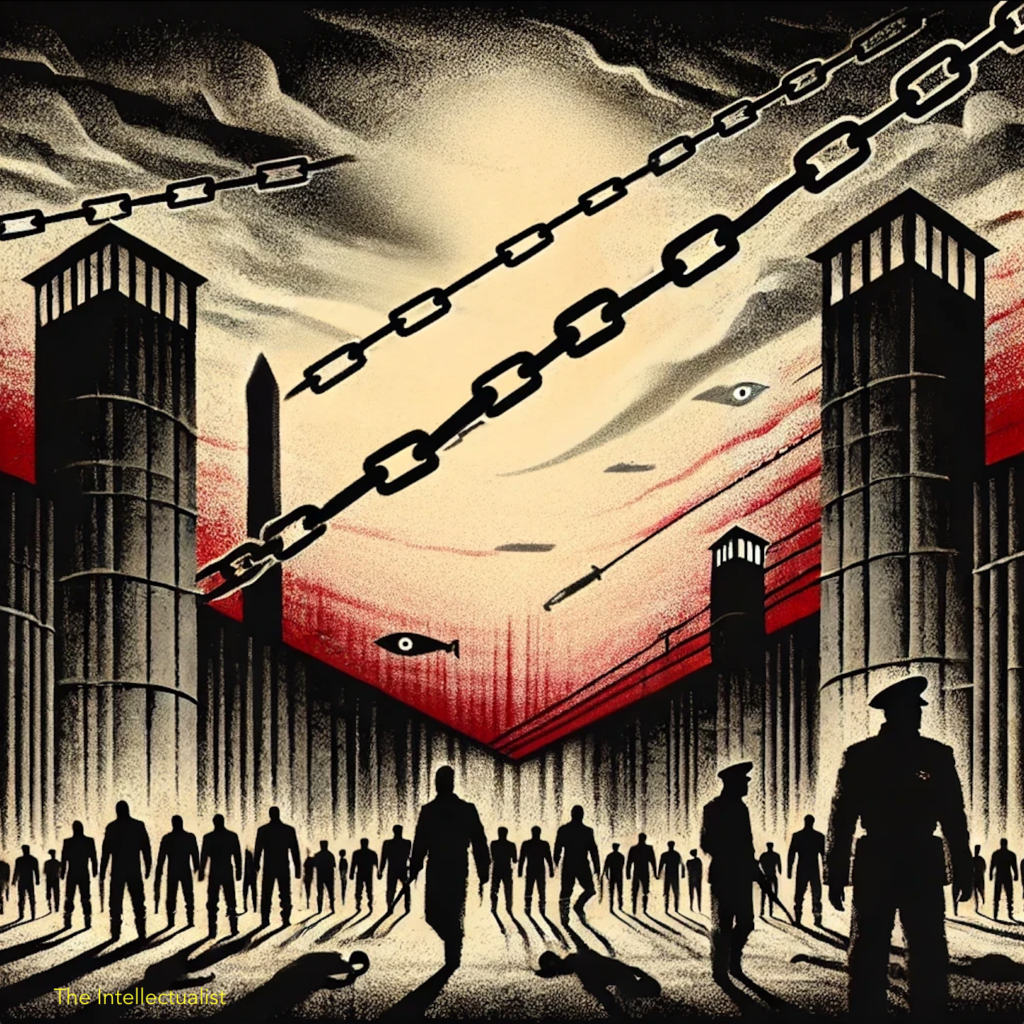Trump v. United States: A Blueprint for Tyranny

The Existential Threat to American Liberty
The Supreme Court’s Decision and Its Implications
The 2024 presidential election is crucial for American history. The Supreme Court’s decision in Trump v. United States extends presidential powers beyond what the Founders intended. This ruling turns the presidency into an elected kingship, allowing a president to act without legal consequences. An unscrupulous president could use state powers to monitor and judge Americans, leading to totalitarianism.
While these concerns might seem exaggerated, Trump’s past behavior and the actions of his associates show they are not. If Trump becomes president with Trump v. United States in place, the dangers could be severe. Let’s explore how a Trump presidency could operate under these rules.
Presidential Immunity and Legal Loopholes
Former President Trump often exploits legal loopholes. He might claim any criminal actions he commits are official, using the presumption of immunity to his advantage. This could let him act while legal decisions take years. Given his age and the political landscape, this is dangerous.
Official vs. Unofficial Acts: A Smokescreen
The Supreme Court’s focus on distinguishing official from unofficial acts obscures broader issues. Presidents can intentionally engage in “unofficial acts” by laundering these activities through official actions, thus gaining immunity.
Interlocking Legal Shields: The Anatomy of Presidential Immunity
Laundering Unofficial Acts
Presidents can funnel unofficial acts through official processes, transforming criminal behavior into actions protected by presidential authority. This process masks illicit activities as official duties, granting immunity from prosecution.
Presumption of Official Acts
All presidential acts are initially presumed to be official. The government must prove otherwise, which can take years. This presumption protects presidents from immediate legal challenges, allowing potentially criminal actions to remain unaddressed for long periods.
Unreviewable Pardon Power
If indicted, a president can pardon themselves. Trump v. United States states that presidential pardons are unreviewable by Congress and the courts. This means a president could pardon themselves for any crimes, whether official or unofficial. This lack of accountability undermines justice and the rule of law.
How Trump Could Exploit Presidential Power to Evade Prosecution and Get Away With Murder
This analysis is based on a hypothetical scenario discussed during court arguments. Judge Florence Pan asked Trump’s lawyer if a president could order SEAL Team 6 to assassinate a political rival and still be immune from prosecution. Here’s how Trump could exploit this situation.
Scenario 1: Laundering an Unofficial Act
Trump decides to murder certain members of Congress. He claims these assassinations are in the national security interest, arguing they are colluding with terrorists. By framing this act as national security, he transforms it into an official duty. This manipulation allows him to shield the act from legal scrutiny using presidential immunity.
Scenario 2: Indictment and Presumption of Official Acts
Congress appoints a special counsel to investigate the murders. Before the investigation progresses, Trump asserts that these murders are official acts. This legal battle could take years, with appeals from the Supreme Court to district courts. Meanwhile, Trump continues laundering unofficial acts into official ones.
Scenario 3: Prolonged Litigation and Pre-emptive Pardons
After years of litigation, if the special counsel proves Trump’s actions were unofficial, Trump can preemptively pardon himself and everyone involved. The Supreme Court reaffirmed that courts and Congress cannot review presidential pardons, solidifying the unreviewable nature of these pardons.
Scenario 4: Retaliation and Further Abuse of Power
Angry at the special counsel, Trump asks the Secretary of Defense to detain prosecutors, accusing them of collaborating with terrorists. This false accusation leads to their arrest. With his power unchecked, Trump operates above the law.
The Dangers of Unchecked Presidential Power
This hypothetical scenario shows the severe risks of unchecked presidential power. By laundering unofficial acts, exploiting immunity, using preemptive pardons, and retaliating against legal authorities, a president can evade prosecution and undermine democracy. This unchecked power threatens the rule of law and the integrity of democratic institutions.

